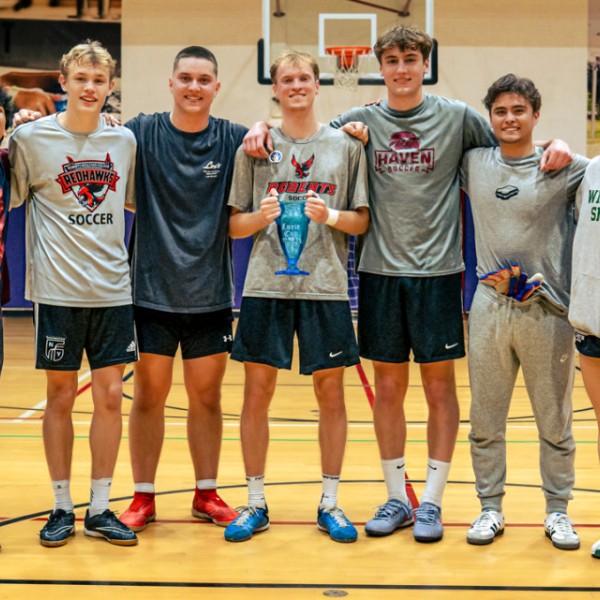Supporting students and faculty to undertake research in the U.S., Africa, South Asia and Latin America, the Polson Institute of Global Development announced its spring 2025 grant winners earlier this month.
“Never has support for development been more pressing than now,” said Mildred Warner, director of the Polson Institute. “Global Development faculty and students are at the forefront of new techniques and approaches to addressing critical agriculture and development topics,” she said.
Grantees initiatives include using games as a method of environmental research, encouraging workshops to better understand the demographic transition and the circular economy, and a pair of studies looking at the impact of Artificial Intelligence (AI) on data and on industrial policy.
In celebration of the Polson Institute celebrating 25 years of operation in 2026, two awarded grants will also support a set of reflective events, both acknowledging the Institute’s past activities and new challenges ahead.
“Development is at a crossroads,” said incoming Polson Institute Director Jack Zinda. “We look forward to hosting a conference in 2026 to critique the state of the field and explore new initiatives.”
The range of exciting initiatives, as shown in the grant summaries below, helps explain why Cornell’s Department of Global Development is a leader in the field.
Spring 2025 Polson award abstracts:
Title: Building a stakeholder network on circular bionutrient economy in East Africa Collaborators
PIs: Johannes Lehmann, Rebecca Nelson, Chuan Liao, Lori Leonard
Abstract:
The food system is both unsustainable and wasteful, relying on mined and fossil-fuel-intensive nutrient inputs that are then discharged as waste into the environment. The food system’s dependency on the use of synthetic fertilizer is increasingly untenable, because of both rising energy costs and the environmental costs of reactive nitrogen and excess phosphorus. We therefore created The Circular Bionutrient Economy Network (CBEN) to build the research, policy, and operational basis for a circular economy for nutrient to sustainably transform underutilized organic resources such as crop residues, market waste, and livestock and human excreta, to produce fertilizers and soil amendments in Sub-Saharan Africa. CBEN unites a community of practitioners from over 16 countries and 120+ organizations specializing in waste recovery systems such as black soldier fly farming, biochar, and excreta recycling. Principled in democracy, transparency, and strong collegiality, CBEN is a platform for collaboration among researchers, NGOs, industry partners, and government representatives. By co-creating a robust community of purpose, the Cornell faculty and students integrate their research into real-world applications, spur further research collaboration, and bring science to soils.
Title: Portable Food Transfers for Migrant Populations: Insights from India's National Food-Based Safety Net Program
PIs: Raghav Puri & Bharath Chandran
Abstract:
In-kind food-based safety nets play a pivotal role in ensuring food security for low-income households. In India, the Public Distribution System (PDS) provides 5 kg of free food grain to over 800 million individuals every month. Until recently, PDS beneficiaries could only collect their food grain from assigned PDS shops. This often led to the exclusion of migrant households who were unable to access their food benefits when away from their assigned shops. To address this issue, the PDS introduced portability, which allowed beneficiaries to collect their food grain from any PDS shop across the country. In this mixed-methods study, we will examine the effectiveness of portability in improving food security for low-income migrant households by analyzing administrative data and conducting qualitative interviews with PDS beneficiaries. These interviews will be conducted in two districts with high rates of migration but different levels of portable transactions to identify the determinants of successful implementation.
Title: From Margins to Mainstream: Global Inequality in the Demographic Century
PIs: Parfait Eloundou Enyegue, Katharina Geppert, Hyo Joo Lee, Alvaro Padilla Pozo, Nathalia Santos, Duke Mwedzi, Kathryn Foster, Thelonious Goerz, Chae Kim
Abstract:
The global population stands at an important moment in human history. Industrialised countries are experiencing rapid population aging, triggering fears of demographic and economic collapse. In the Global South, the opposite is true: birth rates in youthful populations remain stubbornly high, reviving debunked but persistent narratives around overpopulation and resource depletion. A proposed ‘solution’ by the World Bank and UN is facilitating migration of skilled workers from high- to low-fertility countries, but the sociopolitical consequences of this approach are not clear. In addition, policymakers have historically attempted to manage human behaviour and population growth directly, though this has proven to be completely ineffective and devastating to human wellbeing. We explore alternative approaches that respond to shifting population dynamics and ensure political stability, economic equality, and social cohesion. Our activities will include a biweekly reading group, workshops on engaging with policy as researchers, and professionalisation events with virtual guest speakers.
Title: Toward a Sustainable and Sustaining Lake Economy: Lake Victoria Aquaculture Strategic Planning Workshop for Aquaculture Resource Centers (ARCs)
PIs: Ndgunge Kitti, Eli Newell, Pete Ondeng, Victor Didi, Lake Victoria Aquaculture, Maseno University
Abstract:
Smallholder aquaculture in Lake Victoria has significant potential to enhance regional nutrition security and economic growth, yet the sector remains underdeveloped due to persistent challenges: high input costs, inadequate infrastructure, limited access to technology and expertise, weak market linkages, and insufficient extension services. These factors limit productivity, deter investment, and reduce competitiveness. Unlike more organized agricultural sectors, Lake Victoria’s fishery is fragmented and lacks effective coordination mechanisms to ensure accountability, sustainability, and efficiency.
In response, the Lake Victoria Aquaculture (LVA) Association, is leading the Aquaculture Resource Center (ARC) concept to facilitate access to inputs, services, and markets. Through a collaborative, multi-stakeholder approach, LVA aims to build consensus and mobilize broad support. Following a pilot study from January 2025, LVA and Cornell partners will convene a high-level stakeholder workshop in Kisumu, Kenya in Mid-2025. The workshop will generate critical data to inform ARC implementation and guide broader organization of the sector.
Title: Cornell Environmental Games Clinic
PIs: Andrew Bell & Einaudi Center
Abstract:
The Cornell Environmental Games Clinic will provide community engagement, training, and issue-specific support in the development of games interventions for research, learning, and facilitation in all areas of just environmental development and governance. The Clinic will provide an opportunity to bridge diverse and sometimes competing goals of developing games as research instruments, as experiential learning tools, and as facilitation devices, thus acting as a focal point for several literature domains. As well, the Clinic will improve on existing modes of support for students and ECRs tackling the conceptual and operational challenges of game and experimental interventions in areas central to Global Development’s strengths in justice, sustainability, and environment. With support from Polson, the Clinic’s first activities will include a Fall 2025 participatory workshop drawing together games practitioners from across Cornell and beyond, and develop a program for online and in-person engagement and support for the coming years.
Title: Critical Praxis of AI- Transforming Development and the Environment
PIs: Jenny Goldstein, John Sipple, Steven Wolf, Aaron Benanav, Mai Ichihara, Eve Devillers
Abstract:
This Research Working Group will develop a critical praxis framework for understanding AI's expanding role in environmental research and development practice. We'll examine AI as a set of socio-natural relations that transform how environments and communities are known and managed. Centering praxis—integrating critical theory, reflection, and practical action—we move beyond both techno-optimism and wholesale critiques of AI. We'll investigate the material and political dimensions of AI through cases including data centers, energy use, resource extraction, agriculture, labor, and climate adaptation. This approach enables us to analyze power relations and experiment with alternatives serving marginalized communities, while reflexively applying these insights to our own research methodologies. By examining our use of AI tools, data governance, and knowledge production, we'll develop ethical engagement practices for academic contexts, contributing to broader conversations on AI in development work.
Title: Polson Institute Doctoral Field Studies Grant
PI: Rachel Bezner Kerr
Abstract:
Development Studies graduate students often carry out extended field research in international settings, in order to immerse themselves in the local environment, carry out participant observation and examine key questions related to development. This rich and detailed field experience sets the stage for in-depth understanding and gained insight on the complexity of a range of development issues. In the current political and economic context, it is increasingly challenging for students to obtain adequate funding for their doctoral field research. This grant would provide support for travel, in-country living expenses and research expenses for 1-3 graduate students in 2025-26. The award would be provided to students in a competitive basis, with the Graduate Committee making the award decision. They would give a talk in the department about their research as part of the award requirements.
Title: Polson small grant proposal (The Liberty Hyde Bailey Center)
PIs: Scott Peters, John Linstrom, Andy Turner, Anu Rangarajan, Celeste Carmichael, Heidi Mouillesseaux-Kunzman, Melanie Forstrum
Abstract:
With funds from The Polson Institute and the Cornell Rural Humanities Initiative, we propose to organize a retreat that will engage scholars, educators, elected officials, and community leaders from across New York, upstate and downstate, in developing, discussing, and refining a founding vision and set of organizing principles for The Liberty Hyde Bailey Center (LHBC), a project that has been in development for several years. As currently envisioned, the LHBC will serve as a permanent home for engaged work in the rural humanities at Cornell University and across the state. We aim to develop it as a key component of Cornell’s new School of the Environment and Sustainable Development, crossing and interweaving research, teaching, and extension work.
Title: Industrial Policy and the Global Green Transition
PIs: Aaron Benanav and Fouad Makki
Abstract:
This proposal seeks to establish a new working group on industrial policy and the global green transition. Building on the Department’s strengths in development theory and practice, and related expertise in cognate disciplines, we aim to explore the intersection of industrial policy and social and environmental justice. Industrial policy applies to a broad range of economic activities—not limited to industry in the narrow sense—including green energy, agriculture, and digital technologies. It involves efforts to shape the structure and direction of specific industries, technological development, and social outcomes. Our focus is on understanding how such interventions can support equitable and sustainable transitions. With a historically grounded, comparative approach, the group will examine a range of current green policy frameworks to develop criteria for inclusive and effective policy design.
Title: Polson at 25: Learning from our history and building our future
PIs: Rachel Bezner Kerr & John Zinda
Abstract:
The Polson Institute is turning 25 years and has funded a wide range of faculty research and university events related to development, including books, workshops, research working groups and conferences. This award would fund 2 graduate students to do research, in collaboration with the Director of the Polson Institute and the Director of Graduate Studies, on what has been done throughout the history of the Polson Institute. Activities would include reviewing documents from the Polson Institute and interviewing faculty and Development Studies alumni. They would produce a report on their findings, which would be shared at the Polson 25th anniversary event. The graduate students would also assist in the planning of a 2-day event to commemorate the 25thanniversary.
Title: Renewing Development: Commemorating the 25th Anniversary of the Polson Institute
PIs: John Zinda
Abstract:
To commemorate the 25th anniversary of the Polson Institute for Global Development, we propose a two-day event exploring its legacy and charting new directions in a changing landscape. Two keynote addresses and three panels will address dialogue and tension between practice and scholarship in global development across a variety of issues and situations. Within the Global Development unit, the event will propel conversations about what we do. Within the university and beyond, it will raise our profile as a locus for work on development.





